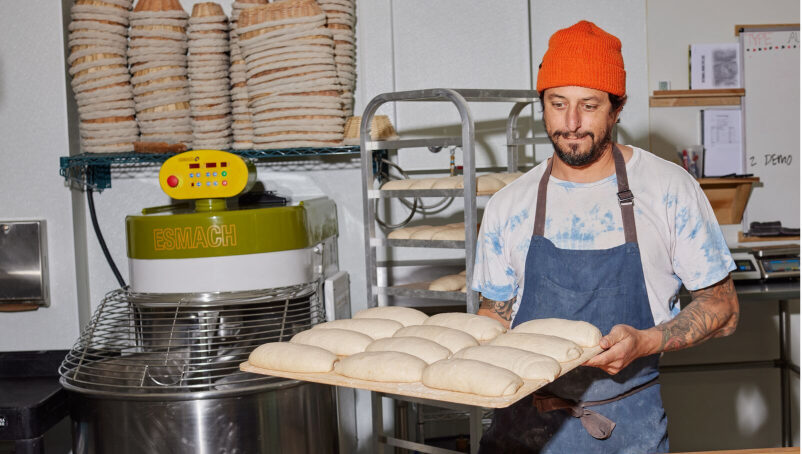Who needs a California food handlers card?
Any employee who qualifies as a food handler is required to obtain a California food handlers card. California workers involved in food preparation, storage or service are categorized as food handlers, including wait staff, chefs, cooks, bartenders and bussers.
There are some exceptions to the requirement to maintain food handler certification. California workplaces that are exempt include:
- Temporary food facilities, such as food booths
- Grocery stores, convenience stores and commissaries
- Volunteer-run restaurants, soup kitchens and food banks
- Public and private school cafeterias
- Certified farmers’ markets
- Licensed healthcare facilities
In addition, employees with a valid manager’s food safety certificate are not required to obtain a food handler certificate. California requires at least one Certified Food Protection Manager (CFPM) for each food facility.
If you don’t have any employees, you must hold a CFPM certification. You have 60 days after your business begins operations or changes ownership to obtain a CFPM certificate.
How to get a food handlers card in California
To obtain a food handling certificate, California workers must complete a CFH training course. Workers in most counties must use a food handler program accredited by the American National Standards Institute (ANSI). Obtaining a California food handler certificate online or through in-person classes is possible.
Workers taking a food handler course must take a test on topics like food handling, employee hygiene and the prevention of foodborne illness. The test has 40 questions, and course participants must pass with a score of 70% or higher.
If you work in Riverside, San Bernardino or San Diego county, however, CFH cards are not accepted. Instead, you must get your card from your county’s local food handler program.
As an employer at a California food service business, you must maintain records that show valid certification for each food handler.
Keep copies of your employees’ CFH cards on file, so they’re available if requested by a health inspector. Failing to maintain these records violates the California Retail Food Law and could result in a misdemeanor.
How much is a food handlers card in California?
According to state law, California food handler certification courses must cost $15 or less. Many options costing less than $10 are available.
Employers are not required to cover the cost of California food handling certification. A food handler card is considered the employee’s property, and they are permitted to use their CFH card at other California food service businesses if they change jobs.
How long does it take to get a food handlers card in California?
State law requires that California food handling certificate courses last no more than three hours, including training and the exam.
Workers are certified once they successfully pass their exam. CFH cards are typically available for instant download or sent by mail.
California food handler cards are valid for three years. Food handlers have to retake the course and pass the test to renew their certification.
Insurance for California restaurants, caterers, cafes and food service businesses
California business insurance can help protect against the many daily risks you face. Most California businesses utilize a combination of these options:
General liability insurance
California general liability insurance can provide important protections for your business if you are held liable for property damage or an injury to someone other than you or an employee.
Foodborne illness coverage can be included with food service general liability insurance to help protect your business if customers become ill after eating food that is incorrectly prepared or contaminated.
Workers’ compensation insurance
Workers’ compensation insurance can help protect your business if an employee gets hurt on the job. All employers in California are required to carry workers’ comp insurance.
Commercial property insurance
California commercial property insurance can help protect your physical business assets, including furniture, equipment, inventory and buildings. If your business property is damaged due to a covered event, such as a fire or a burst water pipe, you can get help paying for repairs and replacements.
Commercial auto insurance
Commercial auto insurance can help cover costs like medical expenses and property damage if you or an employee are involved in an accident while driving a work vehicle.
In California, all vehicles must have minimum auto insurance coverage of $15,000 per person, $30,000 per accident and $5,000 for property damage.
CA food handlers card reciprocity
Food handler cards issued outside the state are valid in California if they are from an ANSI-accredited program.
Workers with food handler certificates issued by Riverside, San Bernardino or San Diego counties may only use them in that county. Employees who work in one of these counties and a California food service business outside those counties must also have a valid CFH card.
How NEXT helps support California restaurants, cafes, caterers and food service
NEXT provides tailored California restaurant insurance coverage for small businesses and self-employed individuals.
It only takes about 10 minutes to get a quote, review your coverage options, choose your policies and download a certificate of insurance.
Our team of licensed insurance advisors is standing by to assist you if you have any questions along the way.
Start a free quote with NEXT.





